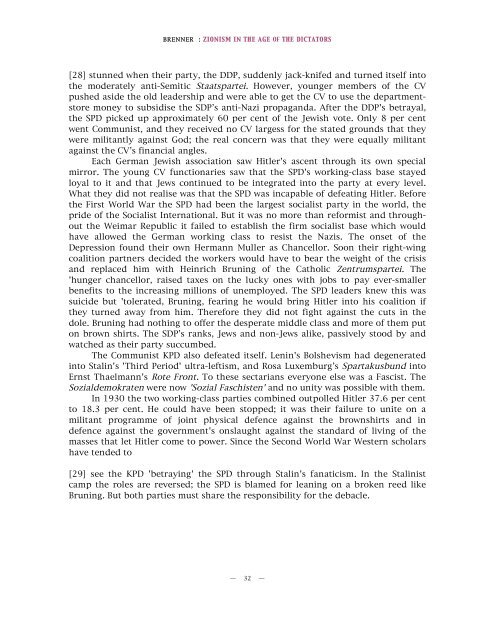You also want an ePaper? Increase the reach of your titles
YUMPU automatically turns print PDFs into web optimized ePapers that Google loves.
BRENNER : <strong>ZIONISM</strong> <strong>IN</strong> <strong>THE</strong> <strong>AGE</strong> <strong>OF</strong> <strong>THE</strong> <strong>DICTATORS</strong><br />
[28] stunned when their party, the DDP, suddenly jack-knifed and turned itself into<br />
the moderately anti-Semitic Staatspartei. However, younger members of the CV<br />
pushed aside the old leadership and were able to get the CV to use the departmentstore<br />
money to subsidise the SDP’s anti-Nazi propaganda. After the DDP's betrayal,<br />
the SPD picked up approximately 60 per cent of the Jewish vote. Only 8 per cent<br />
went Communist, and they received no CV largess for the stated grounds that they<br />
were militantly against God; the real concern was that they were equally militant<br />
against the CV’s financial angles.<br />
Each German Jewish association saw Hitler's ascent through its own special<br />
mirror. The young CV functionaries saw that the SPD's working-class base stayed<br />
loyal to it and that Jews continued to be integrated into the party at every level.<br />
What they did not realise was that the SPD was incapable of defeating Hitler. Before<br />
the First World War the SPD had been the largest socialist party in the world, the<br />
pride of the Socialist International. But it was no more than reformist and throughout<br />
the Weimar Republic it failed to establish the firm socialist base which would<br />
have allowed the German working class to resist the Nazis. The onset of the<br />
Depression found their own Hermann Muller as Chancellor. Soon their right-wing<br />
coalition partners decided the workers would have to bear the weight of the crisis<br />
and replaced him with Heinrich Bruning of the Catholic Zentrumspartei. The<br />
'hunger chancellor, raised taxes on the lucky ones with jobs to pay ever-smaller<br />
benefits to the increasing millions of unemployed. The SPD leaders knew this was<br />
suicide but 'tolerated, Bruning, fearing he would bring Hitler into his coalition if<br />
they turned away from him. Therefore they did not fight against the cuts in the<br />
dole. Bruning had nothing to offer the desperate middle class and more of them put<br />
on brown shirts. The SDP’s ranks, Jews and non-Jews alike, passively stood by and<br />
watched as their party succumbed.<br />
The Communist KPD also defeated itself. Lenin's Bolshevism had degenerated<br />
into Stalin's 'Third Period' ultra-leftism, and Rosa Luxemburg’s Spartakusbund into<br />
Ernst Thaelmann's Rote Front. To these sectarians everyone else was a Fascist. The<br />
Sozialdemokraten were now 'Sozial Faschisten' and no unity was possible with them.<br />
In 1930 the two working-class parties combined outpolled Hitler 37.6 per cent<br />
to 18.3 per cent. He could have been stopped; it was their failure to unite on a<br />
militant programme of joint physical defence against the brownshirts and in<br />
defence against the government's onslaught against the standard of living of the<br />
masses that let Hitler come to power. Since the Second World War Western scholars<br />
have tended to<br />
[29] see the KPD 'betraying' the SPD through Stalin's fanaticism. In the Stalinist<br />
camp the roles are reversed; the SPD is blamed for leaning on a broken reed like<br />
Bruning. But both parties must share the responsibility for the debacle.<br />
— 32 —


